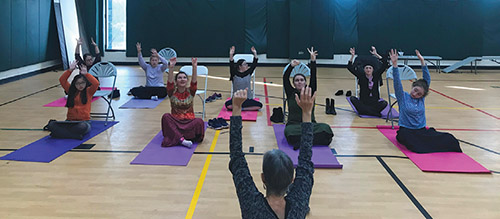
If you were to enter a SINAI classroom at Ma’ayanot at 9:10 a.m. on any given day, you would find our students practicing mindfulness, a form of meditation that has been embraced by the special education community but benefits students of all abilities. The goal of mindfulness is to enhance a person’s ability to focus on his or her present state through the use of breathing methods and guided imagery. For these students especially, days can be filled with frustration, chaos, disappointments, laughter, noise, hustle and bustle and sensory overload and demands. The ability to focus is a skill special education teachers strive to inculcate in their students. Understandably, while focusing is especially difficult for students in the special education community, it is certainly a struggle we can all relate to.
At SINAI at Ma’ayanot, the transformative effects of this practice are evident. Our students are young women ages 14-21 and they come to us from across the area. As with all teenagers, life for these young women includes both ups and downs. Just like their cohort of high school peers receiving a regular Ma’ayanot education, they too have talents, are funny, are interested in fashion, food, friends and relationships. They too wonder about their future, and what they will accomplish. They too become overwhelmed, stressed, busy, tired and anxious.
Unlike their peers, SINAI students have developmental, cognitive and/or physical challenges that impact their proficiency with daily living skills, reading and writing, and their interactions with those around them. This means that our goal at SINAI Ma’ayanot is to provide a functional education: to read and follow a recipe, send and receive emails, have a back and forth dialogue, send a text message, make lunch and follow a shopping list. As special education teachers, we want our students to become as independent as they possibly can despite their challenges. This means asking the fundamental question: “How can I ensure that you have a successful day? What do you need?” This leads us back to the daily practice of mindfulness, where each student has the opportunity, if only for a few minutes each morning, to sit quietly and engage with herself, letting any distractions or worries float away.
SINAI students know that starting their day in a calm and focused way sets the tone for the rest of the day. To sit silently and mindfully focus on one’s breathing is not an easy task; it takes practice and skill. At SINAI we have a saying: “Some things are hard, but we do hard things.” That is why we practice each day, twice a day, five days a week. We do this for the purpose of enriching ourselves, allowing each of us to become better versions of ourselves. Our students know that practicing mindfulness regularly decreases anxiety and stress and increases mood, self-regulation, and ability to learn. After weeks or months of practice, they begin to understand these things intuitively.
I have the privilege of watching our students grow and make progress. Using mindfulness techniques, I watch them participate and immerse themselves in each lesson throughout the day with attention, focus, curiosity and will. Power breaths, sun breaths, belly breathing are all part of a SINAI student’s approach to her day. Mindfulness is a thread that is infused in every activity, from breathing in the morning, to playing basketball, to training for a 5k race, to staying focused in a Chumash or writing class. Mindfulness, our students will say, is being present and aware in the moment.
There is so much to be learned and gleaned from our students. Their willingness to work hard is unparalleled. They want to succeed as much as any other student or peer. Through mindfulness, our students learn and practice how to manage themselves, situations and the multitude of interactions and environmental stresses. Each day, I have the privilege of practicing mindfulness along with them, standing in a circle with eight young women. I find myself inspired by their persistence, wishing everyone had the opportunity to learn the focusing techniques these students employ so successfully.
As we all can agree, life is not always smooth. Each day brings different trials and tribulations, and how we manage and juggle these events is up to each one of us. Training ourselves to react to life’s curveballs in the most productive way is the kindest self-gift we can give. So, if you happen to be walking the hallways of Ma’ayanot on a school day, please stop by to join our circle. I promise that you won’t be disappointed or worried that you are wasting your time. You will be richer for it and leave with a heart full of gratitude and knowledge about how to live each day with greater intention and mindfulness.
A member of the SINAI faculty, Ilana Picker is a teacher for Shalem at Ma’ayanot High School. SINAI operates seven inclusive special education schools for children with a wide range of developmental, intellectual and complex learning disabilities.
By Ilana Picker









